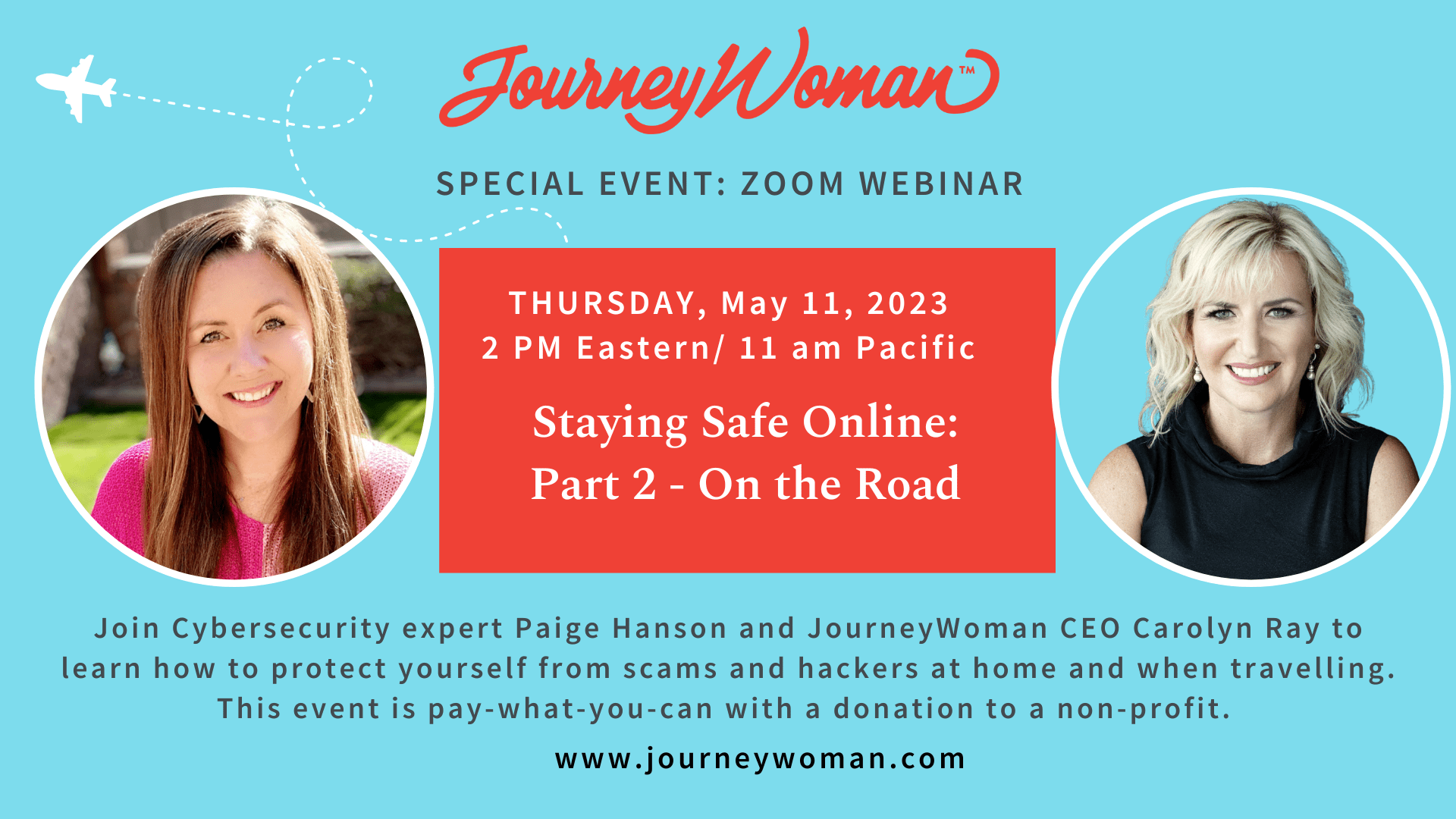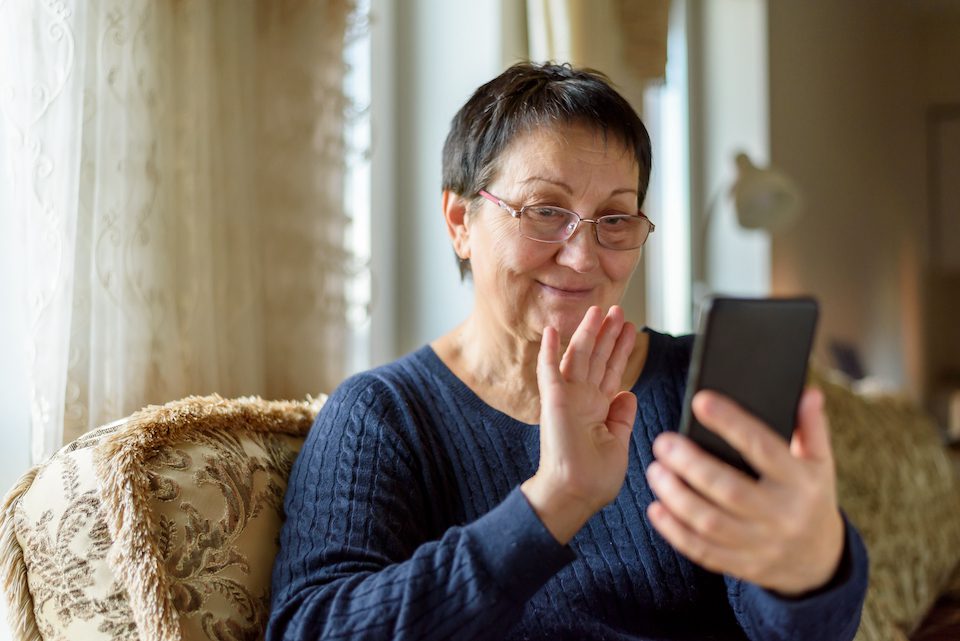Last updated on November 24th, 2024
As cyberattacks increase, learn to protect our online safety
by Carolyn Ray
Scams. Hackers. Fraud. Phishing. Smishing (SMS phishing). Identity theft. Words that strike fear into all of us these days. Even if we have a strong password, we are still vulnerable to cyberattacks. More than ever before, women need to protect our online safety, including our data, privacy and money. With layoffs happening across the technology sector, we can’t rely on others to protect us. We need to know how to protect ourselves and we’ve not a moment to lose!
According to online security company Norton, the top three most reported cybercrimes are: malicious software on a computer, Wi-Fi network, smartphone, tablet, smart home, or other connected devices (24%), unauthorized access on a social media account (14%) and unauthorized access on an email account (14%).
However, scammers are getting more sophisticated and they’re taking advantage of the coronavirus pandemic to con people into giving up their money. Scripps News reports scammers are targeting Medicare recipients across the US, claiming that they need their Medicare information to receive a new card. In 2022, Action Fraud received over 350 reports relating to fake text messages and emails purporting to be from the UK Government. The messages stated that the recipient is “owed” or “eligible” for an energy bill discount as part of the Energy Bill Support Scheme. The links in the emails and texts lead to genuine-looking websites that are designed to steal personal and financial information. There has been a rise in consumers being targeted by phishing emails offering fuel vouchers, phone bill discounts and supermarket offers. These emails are becoming increasingly sophisticated and are designed to harvest personal and financial information. Criminals are experts at impersonating people, organizations and the police.
Two CyberSafety Webinars to help protect our online safety (60-90 minutes each)
We’re hosting two webinars to help you learn how to protect your online safety and answer your questions. Joining us is Paige Hanson, an expert on consumer and digital safety. She is a certified Identity Theft Risk Management Specialist, holds a certificate in Identity Leadership from the University of Texas at Austin, Center for Identity, and has 15+ years of experience in identity management. Hanson’s expertise covers a range of identity fraud and cyber security topics.
Each session is slightly different but there may be some overlap depending on the Q&A.
Please plan to attend at least one of these sessions. Attendance is limited so don’t wait to sign up. Please provide any questions in advance.
Session 1: Thursday, April 13 at 7:00 pm ET: Covering Cybersecurity basics and questions including scams, malware, passwords, two-factor authentication and apps to use, and Q&A
Session 2: Thursday May 11, 2:00 pm ET: Covering travel tips, Virtual Private Networks (VPNs), Identity theft, and Q&A
Sign up for May 11 here::
This is a pay-what-you-can event, with proceeds going to our speaker and Women4Cyber, a non-profit European private foundation with the objective to promote, encourage and support the participation of women in the field of cybersecurity. Please be generous if you can.
These sessions will be recorded and shared on our YouTube channel.

Read More: Top Travel Apps Recommended by Women.
Six Tips to Protect Our Online Safety
1. Watch for email scams. If you get an email saying your password has expired, or that you have a package, check where the email originated from before you click on any links.
2. Use strong passwords and never use the same one twice. You can store all your passwords securely in an app like LastPass which will also generate unique passwords for every website. Get LastPass here.
3. Use two-factor authentication to secure your accounts. This means that when you sign into an online service or account, you have to enter a code that is sent to your email or an app like Google Authenticator.
4. Be careful on Wifi: While many airports offer free WiFi connectivity, you should make sure you’re joining the real, official network from the airport and not a lookalike network that is set up to lure travellers into giving up their usernames and passwords. Always use a VPN to keep your data private. We suggest NordVPN, available here.
5. Turn off auto-connect functions for Bluetooth or Wifi: If your personal devices are programmed to auto-connect to WiFi networks, Hanson recommends turning off WiFi and Bluetooth when not in use for further protection.
6. Invest in Antivirus software like Norton Antivirus or McAfee Antivirus Plus (available here) on your computer and your phone.
About Paige Hanson, Our CyberSafety Expert
Paige Hanson serves as an expert on consumer and digital safety. She is a certified Identity Theft Risk Management Specialist, holds a certificate in Identity Leadership from the University of Texas at Austin, Center for Identity, and has 15+ years of experience in identity management. Hanson’s expertise covers a range of identity fraud, cyber security topics and family discussions on how to help kids stay safe online.
Hanson designed a national identity theft training program for law enforcement in partnership with FBI-LEEDA taught across 50 states presented to over 17,000 law enforcement officials, representing over 6,000 agencies. Hanson was also a liaison with National Organization for Victim Assistance (NOVA), and assisted in training over 3,000 victim advocates and military personnel.
Hanson speaks regularly at events nationwide to increase awareness around identity theft, and her expertise has been sought by numerous media outlets. Personally, Paige resides in Arizona with her husband, daughter and their boxer dog, Tyson. No, that isn’t her password. 🙂
Read More: Six Safety Tips for Online Dating.
Proceeds from this webinar will go to Women4Cyber
Women4Cyber is an initiative that aims to help fill the gender gap among cybersecurity professionals in Europe. In pursuing this objective, our primary goal is to encourage and promote the skilling, up-skilling, and re-skilling of girls and women towards cybersecurity education and professions. Learn more here.

Resources to learn more about Cyber Safety
More on Women’s Safety
When Something Goes Wrong: What to Do if You’re Injured While Travelling
Anything can happen on a vacation. Here are some first-hand tips for women to plan for an unexpected injury.
JourneyWoman Webinar: Women’s Safety and Cybersecurity on November 19, 2024
Join our panel of experts on November 19 to learn how to protect yourself against cybersecurity at home and while traveling.
Planning for an Emergency During Travel: Safety Tips for Earthquakes, Forest Fires and More
Unpredictable weather patterns mean that women need to be prepared for natural disasters, from forest fires to earthquakes.






0 Comments
We always strive to use real photos from our own adventures, provided by the guest writer or from our personal travels. However, in some cases, due to photo quality, we must use stock photography. If you have any questions about the photography please let us know.
Disclaimer: We are so happy that you are checking out this page right now! We only recommend things that are suggested by our community, or through our own experience, that we believe will be helpful and practical for you. Some of our pages contain links, which means we’re part of an affiliate program for the product being mentioned. Should you decide to purchase a product using a link from on our site, JourneyWoman may earn a small commission from the retailer, which helps us maintain our beautiful website. JourneyWoman is an Amazon Associate and earns from qualifying purchases. Thank you!
We want to hear what you think about this article, and we welcome any updates or changes to improve it. You can comment below, or send an email to us at [email protected].